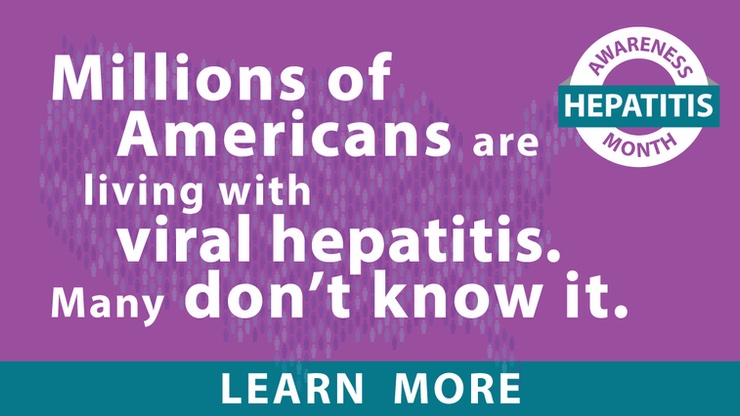This month of May, we are commemorating Hepatitis Awareness Month! We at Valeda RX are working to raise awareness surrounding Hepatitis and encouraging everyone to get tested for Hepatitis once to help the CDC’s efforts to eradicate the virus and say #kNOwMoreHepatitis. There are 5 different types of the Hepatitis virus: Hepatitis A (HAV), Hepatitis B (HBV), Hepatitis C (HCV), Hepatitis D (HDV), and finally Hepatitis E (HEV). Today we will be taking a look specifically at Hepatitis C. At Valeda Rx, we work very closely with HCV patients as HCV is one of the major disease states that we specialize in.
Hepatitis C is an infection of the liver caused by the Hepatitis C virus (HCV). Hepatitis C is spread through blood contact from another infected person. Many people become infected with HCV through the act of sharing needles or other equipment used to prepare and inject drugs, blood transfusions before 1992, and unregulated tattoos or body piercings. For some, Hepatitis C is a short-term illness, but for more than half of those who do become infected with HCV, it becomes a long-term and chronic infection. Chronic Hepatitis C can result in serious, life-threatening health issues. These health issues majorly include cirrhosis and liver cancer. Many people who have chronic Hepatitis C can have no symptoms as well as not feeling sick. When symptoms do eventually appear, they are often a sign of advanced liver disease. The CDC recommends that all adults 18 years and older be tested for Hepatitis C at least once in their life, and all pregnant women during each pregnancy. The CDC also recommends that people with high risk factors, including those who inject drugs, have multiple partners, or anyone who received a blood transfusion before 1992, be tested regularly. Getting tested is so important because treatments can fully cure most people who have Hepatitis C with 8 to 12 weeks course of therapy.
There are so many symptoms of Hepatitis C that most people don’t realize the symptoms are caused by the infection. Many of the symptoms that may occur are so mild that they are unlikely to prompt a visit to a health-care provider. Someone with a new infection is usually asymptomatic and might overlook any of the symptoms that follow as the infection worsens. When symptoms do occur, they can include:
· Fever
· Fatigue
· Dark urine
· Clay-colored stool
· Abdominal pain
· Loss of appetite
· Nausea
· Vomiting
· Joint pain
· Jaundice
· Depression
The onset period for those who do develop symptoms is typically between 2-12 weeks from exposure to symptom onset (ranging: 2-26 weeks). Many people don’t even find out they are HCV positive until they are screened for blood donation or if elevated liver enzymes are detected during a routine examination.
The most important thing you can do is get tested. If you do test positive, treatment is readily available and simple. The most common therapies are oral tablet medications you take daily over the course of approximately 8 weeks. Depending on the state of the infection, and other factors, treatment can last anywhere between 8-24 weeks, however 8 weeks is most common. The treatment is successful when the virus is completely undetectable in the patient’s lab results. Hepatitis C treatment has advanced so rapidly and to such precision that Hepatitis C can be cured, whereas not that long ago there used to be ongoing treatments that would absolutely ravage the patient with unpleasant side effects. The most common side effects of the medications that are out there today are fatigue, headache, nausea, and diarrhea, all of which are incredibly manageable with lots of water and eating with the medication.

Since our inception, Valeda has been treating patients with Hepatitis C using these treatments. It can be an intimidating diagnosis, which is why we hold the patient’s hand throughout the entire process. We work with 501C3 organizations to access funding and grants to make sure the patient pays as little as possible, and most of the time have no copay whatsoever! Our pharmacists give an initial clinical counseling with the patients to answer any preliminary questions they may have regarding their diagnosis, treatment, medication side effects, as well as calm any nerves they might have due to the diagnosis. Our pharmacists also have multiple check-ins throughout treatment to ensure adherence. The biggest concern with these treatments is making sure the patient is adhering to the regimen. Positive adherence is of the utmost importance when treating Hepatitis C to ensure that when they finish treatment, the virus is at an undetectable state. We are by the patient’s side every step of the way and have follow up counseling opportunities to see how they are managing post treatment and follow up with their doctor’s offices to make sure the virus remains undetectable and clear. Hepatitis C is no longer an unmanageable, lifelong diagnosis and at Valeda RX, we are grateful to have the opportunity to support Hepatitis C patients in any way that we can.
